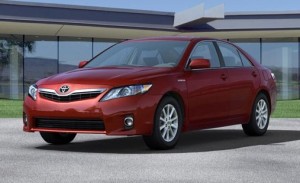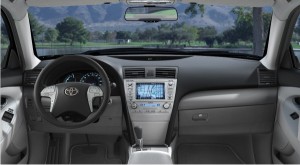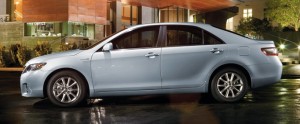 |
| 2010 Camry Hybrid - stylish but subtle hybrid (photo via Toyota.com) |
In the last few months, I've had a chance to test drive both a Toyota Camry Hybrid and a 2nd generation Prius.
I liked both cars, but from an eco-friendly standpoint it seems to me that the Prius is the clear winner. In Colorado, I averaged approximately 50 mpg in mountainous terrain on the 2nd gen Prius. By contrast, in admittedly horrible traffic in and around the New York metro area, I averaged only around 30 mpg in a 2009 Toyota Camry Hybrid.
Now I presume that the 3rd generation Prius (i.e. the 2010 model year currently for sale in dealerships and advertised on Toyota's website) gets even better mileage and delivers even better performance than the Prius I tested, but I'll restrict my comparison to the older Prius that I actually test drove.
So how does the Camry Hybrid match up against a (last generation) Prius?
For me, the Prius wins by a knockout, offering better manueverability, better forward visibility and much better electric-only performance at low speeds. Indeed, one of the selling points of many hybrid cars is that they are supposed to be able to use electric power only to save gas and propel the car at low speeds. The Prius lived up to this billing, but while the Camry shut down its gas engine at stop lights to conserve gas, it seemed impossible to drive the Camry at more than about 5 mph without having the gas engine kick back in.
In terms of performance, neither car will win any drag races. Both perform admirably when cruising at high speeds, but you'll need to leave plenty of time for accelerating, merging and passing.
So why would a buyer putting eco-friendliness high on her list of purchase criteria choose the Camry Hybrid over the Prius? I can think of only a couple of reasons:
1. Anonymity. Prius drivers advertise their eco-minded attitudes to the world. Remove a couple of subtle little badges and the Camry Hybrid looks just like any of the other countless Camrys on the road. Some people like standing out. Others perfer to fly under the radar - the Camry Hybrid accommodates that desire.
2. Sedan v. Hatchback. I quite like hatchbacks both for their style and their versatility, but some people just want to drive a sedan. Since the Prius is only available as a hatchback, that pretty much disqualifies it from contention. I will say however that the Camry's battery pack reduces its trunk space considerably (a point emphasized in this review at eHow.com). One big suitcase will completely fill the trunk space. Fortunately, the Camry Hybrid comes with standard 60/40 split fold-down rear seats, providing some much-needed extra cargo space (as long as you aren't carrying any passengers in the back seat).
 |
| The comfortable, predictable interior of the Toyota Camry Hybrid (photo via Toyota.com) |
3. Comfort. Both cars are comfortable from a driving standpoint. In fact, I think I found the Prius even more comfortable than the Camry Hybrid, but the Camry definitely has a bit of a more plush feeling, more of an intangible cushiness factor. For example, dual-zone climate control comes standard and you can upgrade to an options package with heated front seats.
4. Size. The Camry Hybrid is slightly bigger than the Prius. Both are mid-size cars, but the Camry is a few inches wider and more than one foot longer. The Camry Hybrid also weighs about 600 lbs. more than the Prius. For people who equate size with safety and weight, the Camry Hybrid may feel like the safer choice. Also, because of its bigger exterior dimensions, it has a few more inches of interior space, which may make it more comfortable for some people. (These perceptions may have some basis in reality. The National Highway Traffic Safety Administration gives the Camry Hybrid its highest 5-star rating for frontal crashes, whereas the 2009 Prius received only 4 stars. The 2010 Prius had not yet been rated at the time of this review.)
Bottom Line - It's great to see lots of hybrid cars coming to the market for buyers of all tastes. The Camry Hybrid could be the perfect car for someone who wants a solid, comfortable mid-size sedan with good gas mileage (rated 33 city / 34 highway) at a decent price.
IMHO, the Prius is clearly the more eco-friendly car and also a much better value. The Camry Hybrid carries a MSRP of over $26,000 (my tester was $28,138 nicely equipped and including delivery processing and handling fee). For comparison, the base version 2010 Prius carries a MSRP of $22,000 -- although the top-line version does go up over $27,000.
Incidentally, although the Camry Hybrid is clearly the more eco-friendly choice, it's probably very hard to justify the Hybrid version of the Camry on an economic basis. The non-hybrid base Camry (MSRP $19,395) has a nearly identical highway mpg rating (33 mpg vs 34 mpg for the hybrid) and gets 11 fewer mpg in city driving (22 mpg vs 33 mpg for the hybrid).
 |
| To the casual observer, it's just a stylish sedan. But we know this 2010 Toyota Camry is a hybrid. (photo via Toyota.com) |
Using oversimplified calculations that assume an average mpg half way between the highway and city numbers, we'd get an average mpg of 33.5 for the Camry Hybrid and 27.5 for the regular base Camry. In other words, over 100,000 hypothetical miles of driving, the Camry Hybrid should require 2,985 gallons of gas, while the regular Camry should require 3,636 gallons of gas. Assuming a gas price of $3 per gallon, the regular Camry would require approximately $2,000 more gas over 100,000 miles, which means you would need to drive more than 300,000 miles before you could make up the extra cost of the hybrid purchase.
(Of course, you would make the hybrid premium more quickly if gas prices rose to $4 per gallon or higher as they did in 2008...)
It will be very interesting to keep an eye on innovation in the hybrid sedan segment over the next year or two. With plenty of competition among the Camry Hybrid, the Nissan Altima Hybrid ( 35/33 mpg), the Ford Fusion Hybrid (an impressive 41/36 mpg) and the Mercury Milan (also 41/36 mpg), hopefully we'll soon see some breakthroughs on price, battery performance and/or mileage.
Where to Buy -
Use Toyota's website to find a Toyota dealership near you.
No comments:
Post a Comment